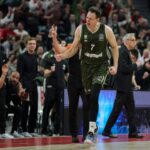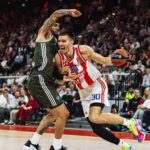 The 2012-13 Adriatic League season tipped off this weekend with all 14 teams playing their first games. BallinEurope contributor Marko Savkovic takes a look at two teams figuring to be fighting for a top spot in the ABA table come season’s end: Partizan Belgrade and Cedevita Zagreb.
The 2012-13 Adriatic League season tipped off this weekend with all 14 teams playing their first games. BallinEurope contributor Marko Savkovic takes a look at two teams figuring to be fighting for a top spot in the ABA table come season’s end: Partizan Belgrade and Cedevita Zagreb.
It was about time! The 2012/2013 edition of the Adriatic League promises us tough competition, has many exciting prospects to showcase, and includes some interesting newcomers with the grand prize awaiting top three teams. Be there crisis or not, let’s play ball. In BallinEurope’s first coverage of the new season in the Adriatic, we concentrate on two of the top contenders, who played each other in the last year’s semifinals: Cedevita and Partizan.
 It has been said over and over again, so don’t mind us repeating it: Cedevita is a brand of instant drink enjoyed in former Yugoslavian countries. Team Cedevita’s success is in many aspects instant as well, but it’s hardly enjoyed by its competitors. By finishing second last year, and especially by defeating Partizan along the way, the team from the Zagreb suburbs has become a red hot favorite with Maccabi Tel Aviv gone.
It has been said over and over again, so don’t mind us repeating it: Cedevita is a brand of instant drink enjoyed in former Yugoslavian countries. Team Cedevita’s success is in many aspects instant as well, but it’s hardly enjoyed by its competitors. By finishing second last year, and especially by defeating Partizan along the way, the team from the Zagreb suburbs has become a red hot favorite with Maccabi Tel Aviv gone.
All the right ingredients seem to be in place. The team’s core is preserved, with Marino Bazdaric, Goran Suton, Miro Bilan and Marko Car kept on board. Arriving from Galatasaray, Luksa Andric should bring more versatility to the paint.
After his brave display in the Croatian playoffs almost saw Cedevita suffer an early exit, youngster Luka Babic was brought over from KK Split, and the signing of Mickael Gelabale speaks millions of how financially stable the club is. As though this were not enough, they got Vlado Ilievski as well, while the transfer window was closing. Finally, the last time Bozidar Maljkovic (who is also at the helm of the Slovenian national team) coached a Croatian side, it was “Jugoplastika” and we all know what happened: basketball magic.
Cedevita is a proper Euroleague team, ready to fight battles on all fronts. It is early to say, however, how the new coach will affect its game. Maljkovic has been criticized for forcing slow, tightly controlled ball; for reasons hardly understandable to us, many fans believe “his time has passed”. Now he will face – not for the first time in his career – a team packed with proven players who will all demand playing time, an ambitious owner and an exhausting schedule. This is why Maljkovic did not want to dwell on his side’s chances in the upcoming season: “I want my team to play without fear, with a conviction it can win a match against any other side”. So much should be granted to him.

Back to his spiritual home after two years, the adored (and scorned) Dule will be in command of a truly international roster packed with talent. They all seem to know what they will be playing for. Leo Westermann, for instance, chose Belgrade over some more lucrative destinations, partly because of his intention to play a different, more physical, more competitive type of basketball; with more than 60 games to play until June, Westermann might well use the opportunity and become the player French fans want him to be. Leo clicked with the Grobari faithful from day one; his Twitter account is a constant reminder of this newfound affection. On the other hand, this must be Davis Bertans’ season. After all, his performance in Serbian league finals proved how he is feeling more at home now.
One trademark of Partizan’s game, i.e. maintaining a strong presence in the paint, should be kept alive with Dejan Musli and Djordje Gagic on board. Musli, who had prematurely left Serbia for Caja Laboral, has plenty of catching up to do. Still very young and inexperienced, he will be faced with great expectations from the start. A recent callup to the national team certainly boosted his confidence. Gagic’s breakthrough performance came with KK Hemofarm last year; while this team was disintegrating, he was consistent. Both Musli and Gagic are agile and fast, although perimeter shooting and passing is something they should improve on.
Torey Thomas and Drew Gordon continue the stream of high-quality Americans who see Partizan as step forward in their careers. It’s a well-known pattern – Vujosevic tends to hire PGs and PFs from the US, seeing these positions as critical to his game plan. Gordon should provide a valuable back up in the paint, with Cakarevic and Lucic, now practically veterans of the team, grabbing that extra rebound. Meanwhile, the latter has been held in such high esteem by “Duda” Ivkovic, who even stressed that team Serbia’s abysmal performance in EuroBasket 2013 qualifications was partially caused by his DNP.
It will still be that familiar Partizan. The real test whether this is one of the best generations in history is only a month away; the Belgrade team will be playing Euroleague group D, meeting against FC Barcelona, CSKA Moscow and Beşiktaş.
Marko Savkovic fell in love with basketball because: a) his older brother used to play, so it must have been a cool thing to do; and b) he witnessed Vlade Divac, Dino Radja and Toni Kukoc play an exhibition match back in 1988. After learning the fundamentals with Partizan Belgrade, Marko spent four years in FMP Zeleznik’s youth system and another three playing lower-division ball. Years later, as a political science graduate, he found a different career for himself, yet remained devoted to hoops. For BallinEurope, he will be closely following developments in the Adriatic league. You may write him at markosavkovic@gmail.com.




